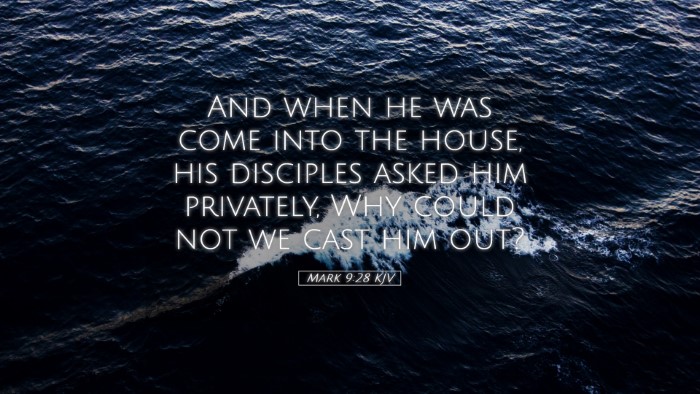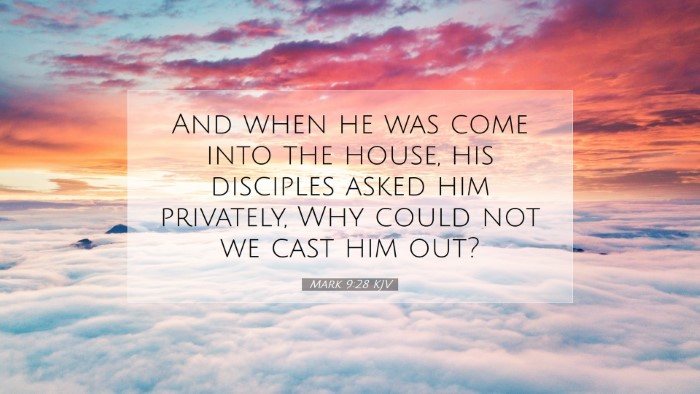Commentary on Mark 9:28
Mark 9:28 states: "And when he was come into the house, his disciples asked him privately, Why could not we cast him out?" This verse provides profound insights into the dynamics of faith, the authority of Jesus, and the struggles of His disciples. Below, we explore various themes and interpretations from renowned public domain commentaries to enrich understanding for pastors, students, theologians, and Bible scholars.
Context and Background
In the context of Mark 9, we witness the aftermath of Jesus' transfiguration, where He revealed His divine glory to Peter, James, and John. Following this, they descended the mountain to encounter a needy multitude and a desperate father whose son was possessed by an unclean spirit. The inability of the disciples to cast out the demon leads to their inquiry to Jesus upon returning to the house.
The Disciples’ Question
This question, “Why could not we cast him out?” is pivotal, revealing both the doubts and the learning process of the disciples. The public domain commentaries provide various interpretations:
- Matthew Henry emphasizes the disciples’ struggle with their faith as they grappled with the limitations of human power versus divine authority. He posits that the disciples expected success in their ministerial endeavors, reflecting a common misunderstanding of relying solely on their abilities.
- Albert Barnes highlights the disciples’ perplexity and highlights the importance of faith in effective ministry. Barnes argues that the casting out of demons is not simply a matter of ritual but requires a genuine and active faith.
- Adam Clarke suggests that the disciples were confused due to their past successes with casting out demons, noting that they had previously been successful in their ministry. Clarke points out this inconsistency leads to their desperate need for understanding and instruction from Jesus.
Theological Implications
The inquiry raised by the disciples ushers in several theological insights worth considering:
- The Authority of Christ: Jesus’ response to their question in following verses indicates that the authority to cast out demons is rooted in His divine power. This underscores the reality that any success in ministry comes from Christ alone, rather than from human efforts.
- Faith as a Requirement: The events serve as a crucial lesson in the nature of faith. As emphasized by commentators, faith is not merely belief but involves trust and reliance on God’s power. Jesus’ subsequent teaching about the need for prayer indicates that deep spiritual engagement is necessary for effective ministry.
- Discipleship and Learning: The question of the disciples reflects their journey of learning and maturing in faith. Henry implies that this moment illustrates the ongoing discipleship process, where believers continually learn and grow in their understanding of God’s work in and through them.
Practical Applications
From this verse, several practical applications can be drawn for contemporary believers and leaders:
- The Role of Prayer: The necessity for prayer as elucidated in the following verses reinforces the idea that spiritual endeavors require readiness and reliance on God. Therefore, prayer should be a foundational practice for believers seeking to serve effectively.
- Recognizing Limitations: Understanding our limitations and the need for divine intervention is essential in Christian ministry. This acknowledgment leads to a more profound humility and dependence on the Holy Spirit.
- Encouragement in Struggles: The struggles faced by the disciples resonate with many today facing challenges in faith and ministry. This passage encourages believers to bring their questions and doubts to Jesus, trusting He will provide clarity and strength.
Conclusion
The inquiry of the disciples in Mark 9:28 opens a rich window not only into their struggle with faith and authority but also serves as a reflective point for contemporary believers. Through the insights of Matthew Henry, Albert Barnes, and Adam Clarke, we see a multifaceted understanding of this interaction. It compels us to remain vigilant in our faith, ever reliant on the power of Christ, and committed to a lifestyle of prayer and learning in our journey of discipleship.


